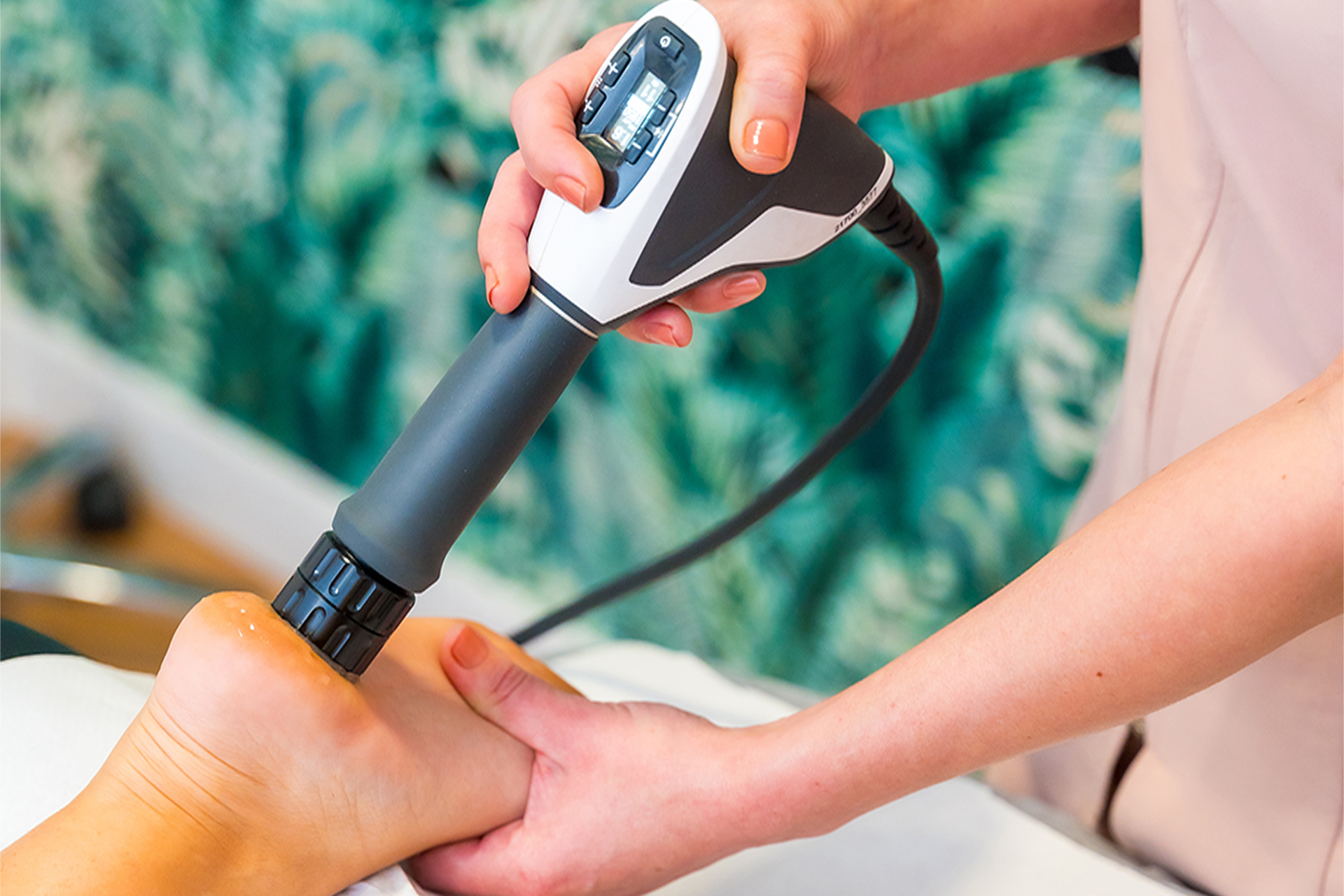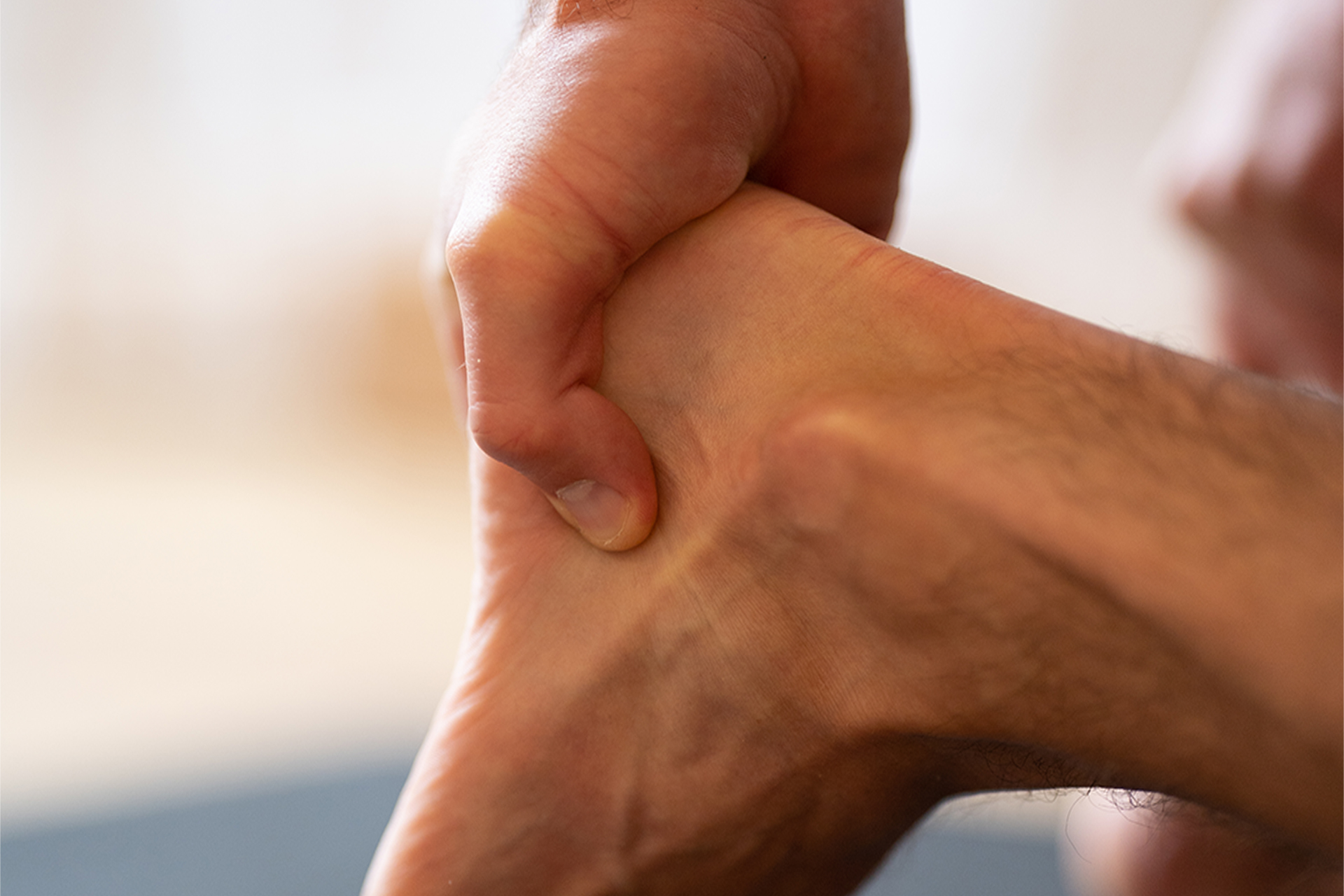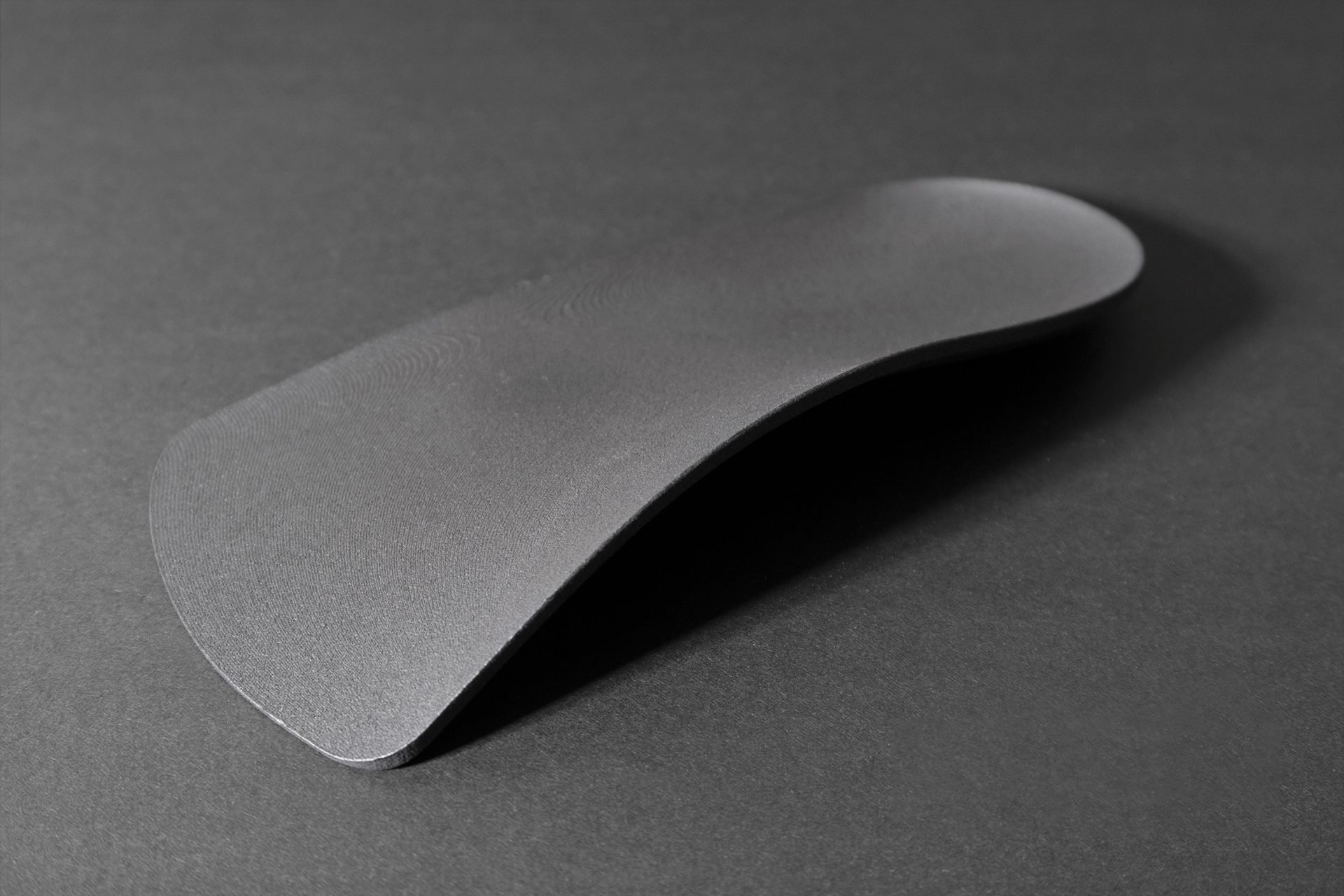Taking those painful first steps in the morning can be excruciating for plantar fasciitis sufferers. If you’re one of the millions battling this debilitating foot condition, Shockwave Therapy for plantar fasciitis might be the solution you’ve been searching for.
Understanding Plantar Fasciitis and Its Impact
Plantar fasciitis is one of the most prevalent causes of heel pain worldwide. This painful condition develops when the plantar fascia — the thick band of tissue connecting your heel bone to your toes — becomes inflamed and irritated. For most sufferers, the pain is most intense during those first morning steps or after rest periods, gradually easing as the foot warms up through movement.
Daily discomfort can significantly impact one’s quality of life, unexpectedly challenging simple activities like walking the dog or climbing stairs. While traditional treatment approaches like rest, ice, stretching exercises, and orthotic devices help many patients, some stubbornly resist these conservative methods.
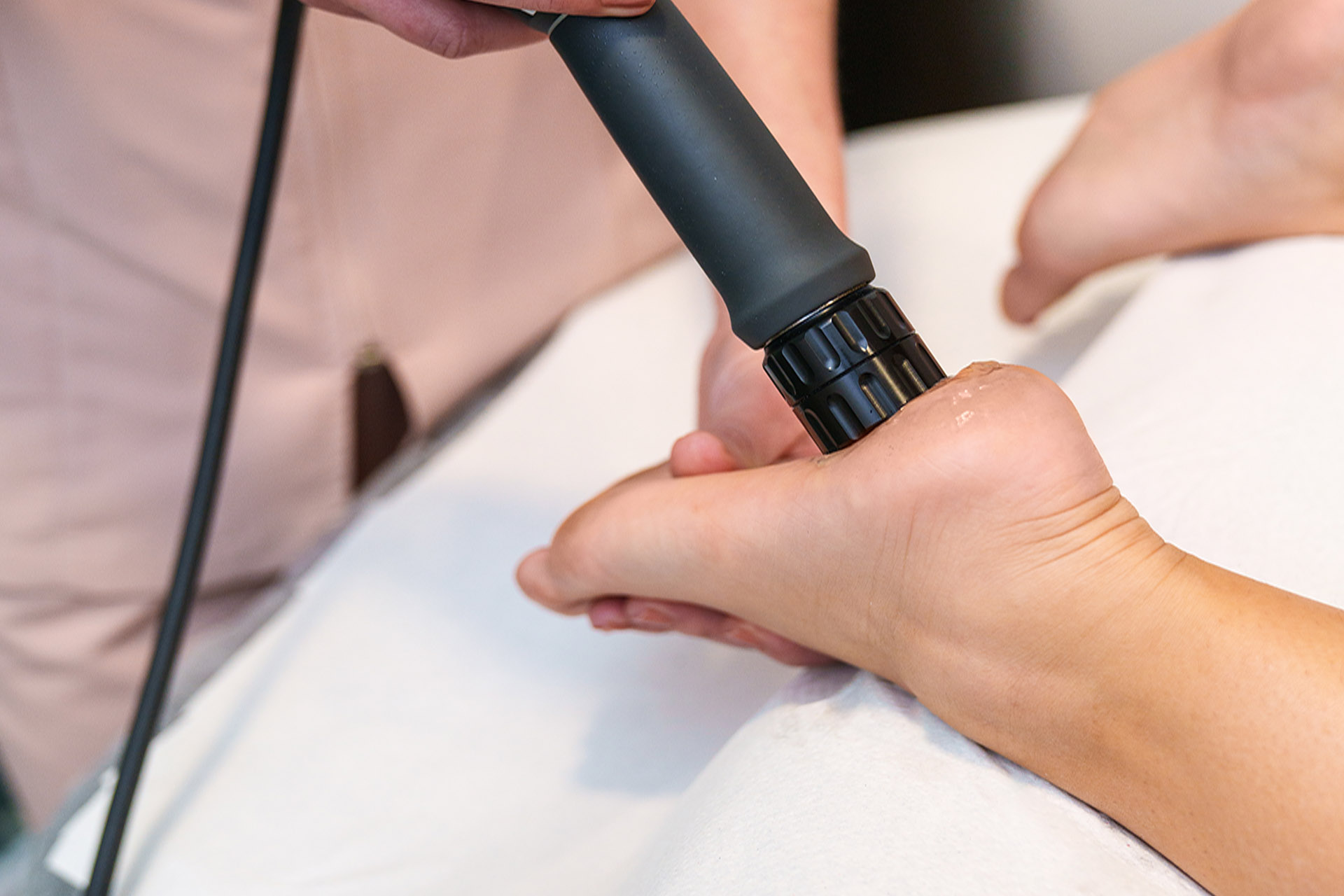
What Is Shockwave Therapy for Plantar Fasciitis?
Shockwave Therapy for plantar fasciitis, also known as Extracorporeal Shock Wave Therapy (ESWT), is an advanced, noninvasive treatment option that addresses the root cause of heel pain rather than merely masking symptoms. This innovative approach uses acoustic pressure waves to stimulate healing in the affected tissue.
The therapy delivers precisely targeted energy waves to the damaged plantar fascia, creating controlled microtrauma that triggers the body’s natural healing mechanisms. Unlike medications that temporarily reduce symptoms, Shockwave for plantar fasciitis promotes tissue regeneration and lasting recovery.
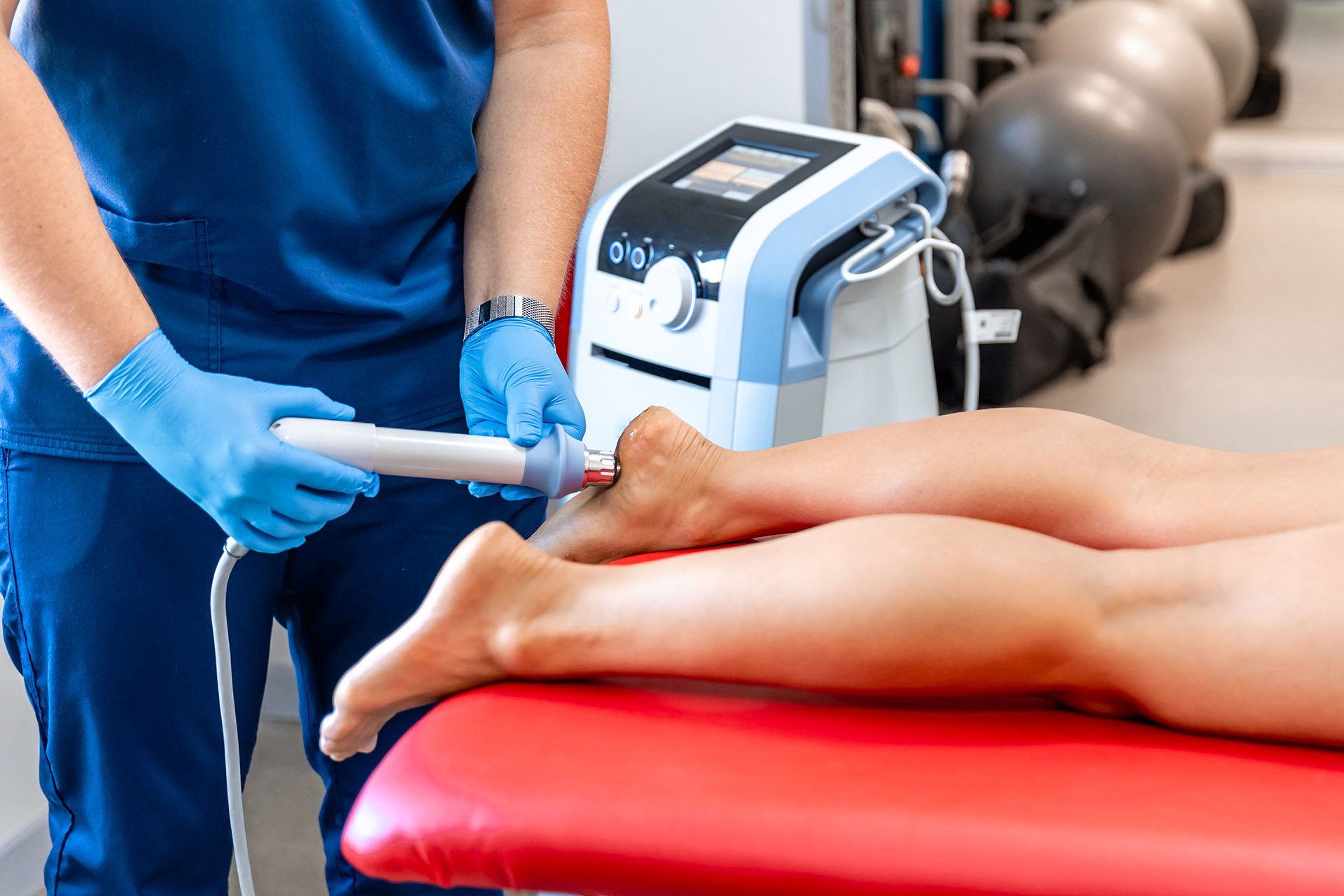
How Shockwave Therapy Works for Foot Pain
Shockwave treatment for plantar fasciitis has emerged as a breakthrough intervention for foot pain, particularly effective for those with chronic conditions. The science behind this remarkable therapy reveals why it’s becoming increasingly favoured by foot specialists across the world.
During treatment, a specialised device delivers focused or radial Shockwave Therapy to the plantar fasciitis site. These acoustic waves penetrate deep into the damaged tissue, stimulating several healing mechanisms:
- Enhanced Blood Circulation: Shockwave Therapy for foot pain promotes new blood vessel formation (angiogenesis), improving oxygen and nutrient delivery to accelerate healing.
- Stimulated Collagen Production: The therapy encourages new collagen synthesis, rebuilding and strengthening the plantar fascia tissue.
- Growth Factor Activation: Treatment triggers the release of healing proteins and stem cells crucial for tissue repair.
- Pain Signal Disruption: Shockwave Therapy for feet desensitises nerve endings, reducing pain perception and providing relief.
- Calcification Breakdown: For chronic cases with calcium deposits, Shockwave Therapy dissolves these formations, restoring normal tissue function.
- Reduced Inflammatory Response: The therapy modulates inflammation, creating an optimal environment for healing.
Radial Shockwave Therapy for plantar fasciitis distributes energy in a more diffuse pattern, making it particularly effective for treating larger areas of tissue damage. This approach provides excellent results for many patients while maximising comfort during treatment.
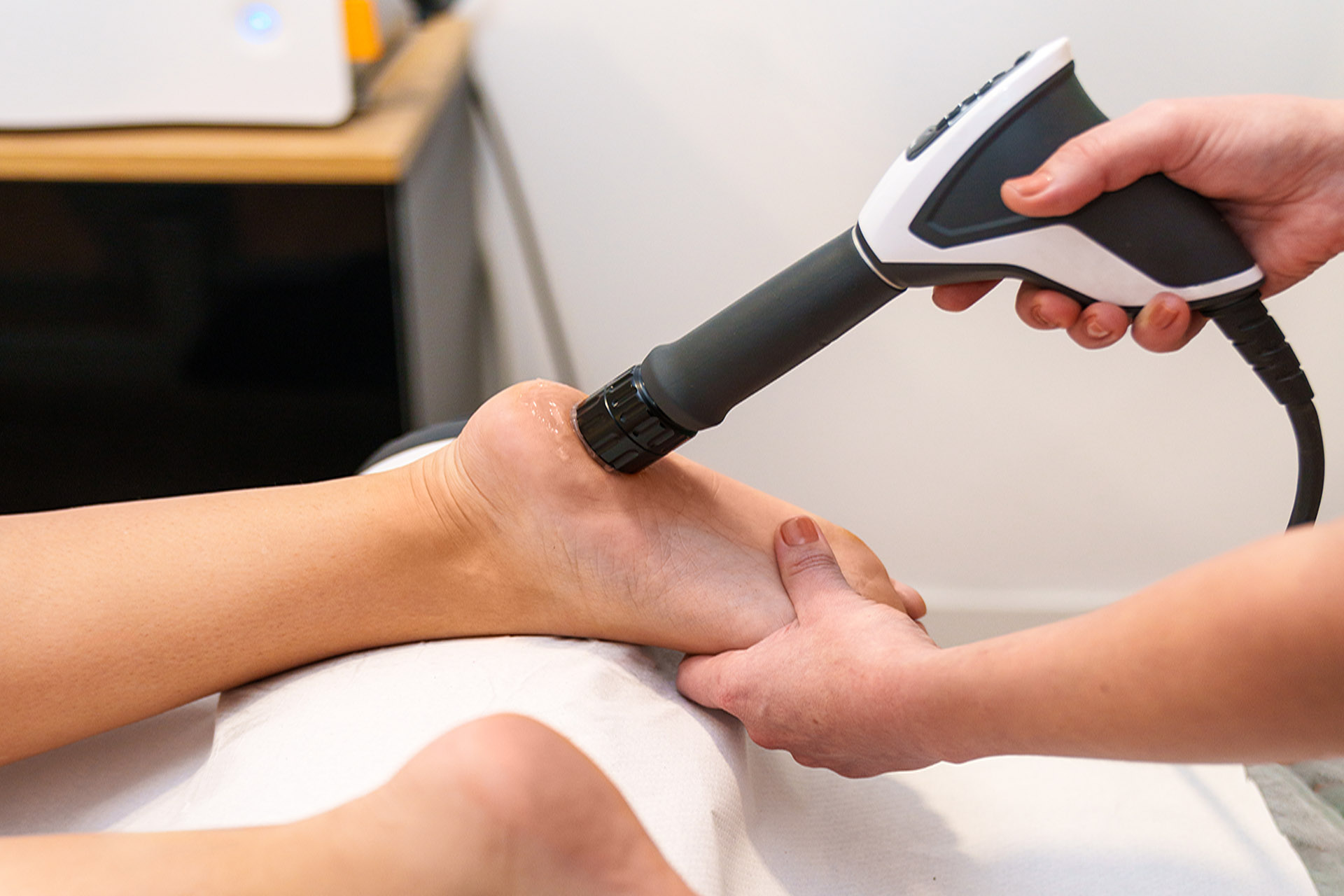
The Treatment Experience: What to Expect
When you arrive for Shockwave Therapy for heel pain, your podiatrist will first apply a special gel to enhance energy transmission. The treatment device then delivers precisely calibrated acoustic waves to the injured area. Most patients describe the sensation as a mild tapping or tingling rather than pain.
A typical session lasts 15-20 minutes, and most treatment protocols involve 3-5 weekly sessions. Many patients report noticeable improvement after two or three sessions, with continued progress in the following weeks as the body’s healing processes accelerate.
Following treatment, you might experience temporary soreness similar to post-exercise muscle fatigue, which typically resolves within 24-48 hours. Unlike surgical interventions, extracorporeal shock wave therapy for plantar fasciitis requires no downtime—you can return to normal activities immediately, though your podiatrist may recommend temporarily reducing high-impact exercise.
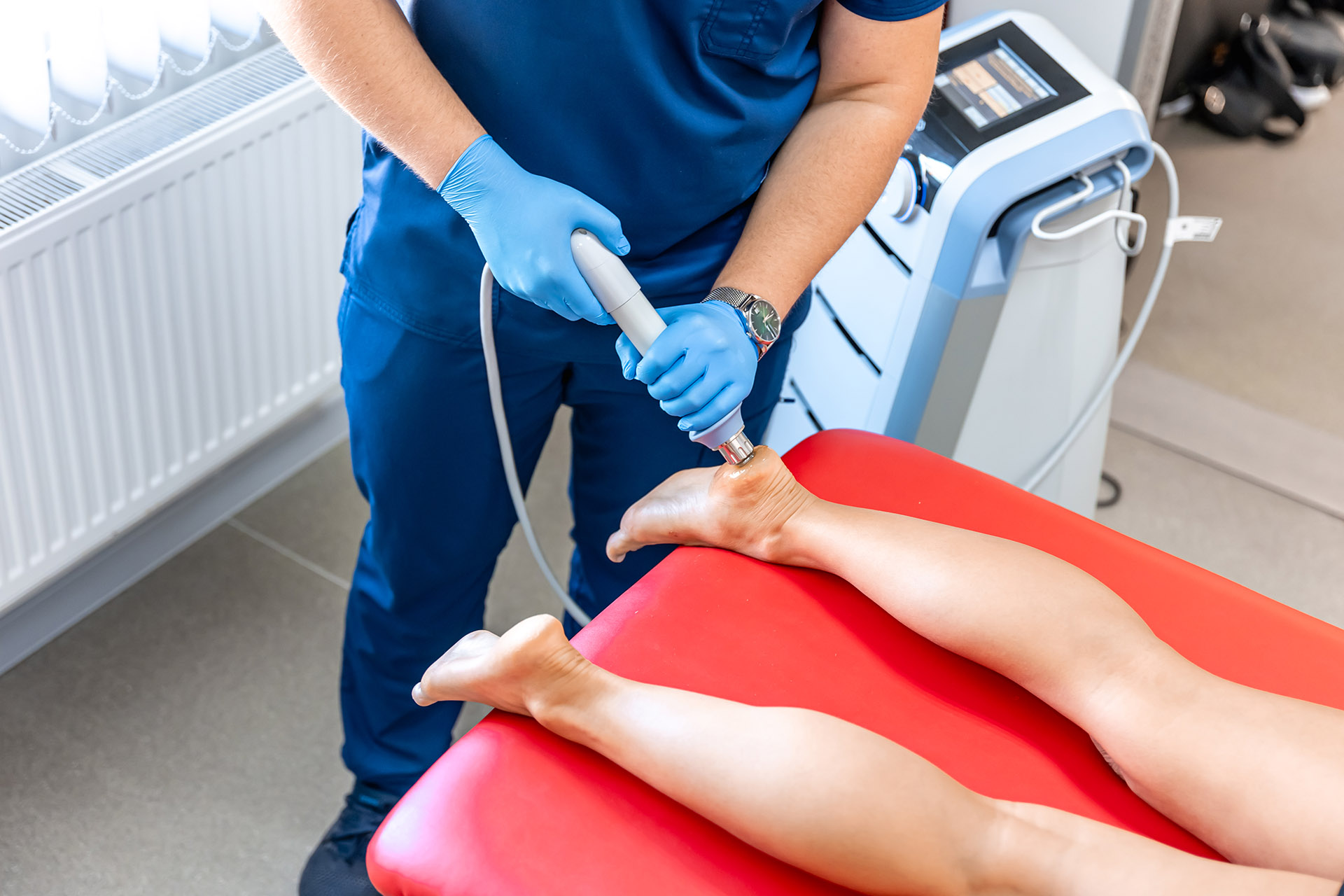
Does Shockwave Therapy Work for Plantar Fasciitis?
The evidence supporting Shockwave Therapy for foot conditions is compelling. Multiple clinical studies demonstrate success rates between 70-95% for chronic plantar fasciitis cases that haven’t responded to traditional treatments. This effectiveness has established Shockwave Therapy as a preferred intervention before considering more invasive surgical options.
What distinguishes Shockwave Therapy from many other treatments is its ability to address the underlying cause of plantar fasciitis rather than merely masking symptoms. By promoting tissue regeneration and improving biomechanical function, the therapy provides sustainable relief and reduces recurrence risk.
Many patients wonder: Does Shockwave Therapy work for plantar fasciitis in every case? While results vary among individuals, the therapy shows particularly strong outcomes for those who:
- Have experienced symptoms for three months or longer
- Haven’t achieved adequate relief from conservative treatments
- Wish to avoid corticosteroid injections or surgery
- Can commit to the full therapy protocol
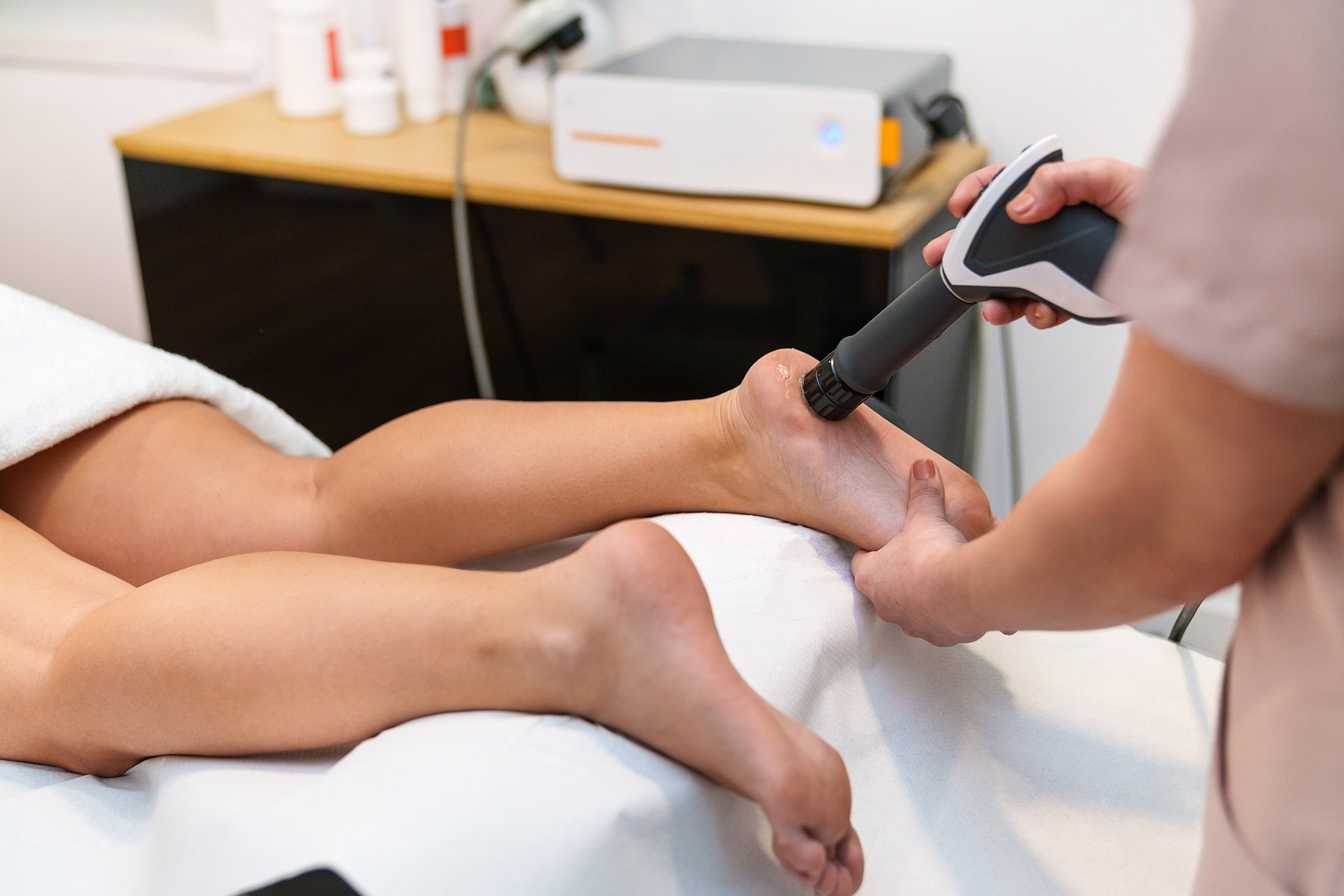
The Podiatric Approach to Plantar Fasciitis Treatment
A qualified podiatrist’s expertise significantly enhances Shockwave Therapy’s effectiveness for plantar fasciitis. These foot specialists bring in-depth knowledge of foot biomechanics and pathology, ensuring precise diagnosis and optimised treatment delivery.
Before recommending Shockwave Therapy, our podiatrist at The Foot Practice will conduct a comprehensive assessment including:
- Detailed medical history review
- Physical examination focusing on tenderness patterns
- Biomechanical and gait analysis
- Imaging studies when necessary to confirm diagnosis
Based on these findings, your podiatrist will develop a personalised treatment plan that may combine Shockwave Therapy with complementary approaches. This integrated strategy maximises healing potential and addresses any underlying biomechanical factors contributing to your condition.
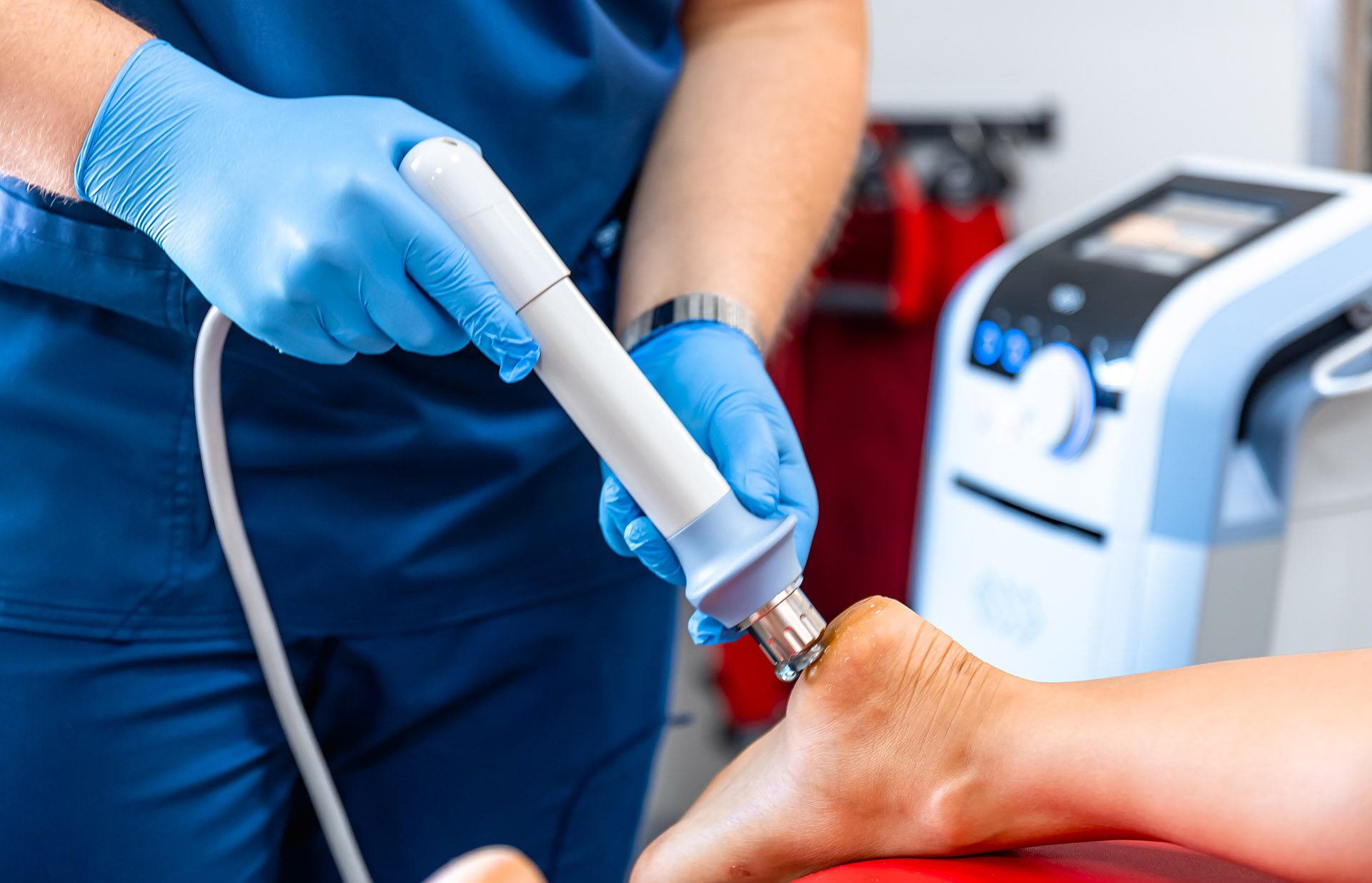
Complementary Treatments to Enhance Recovery
While Shockwave Therapy for foot conditions can be remarkably effective, combining it with other podiatric interventions often produces superior outcomes. Your treatment plan might include:
- Custom Orthotic Devices: Precisely engineered to support your unique foot structure, custom orthotics reduce strain on the plantar fascia during daily activities.
- Targeted Exercise Programme: Specific stretching and strengthening exercises improve foot flexibility and resilience, supporting long-term recovery.
- Footwear Assessment: Guidance on selecting appropriate shoes provides proper support and cushioning to prevent recurrence.
- Lifestyle Modifications: Recommendations regarding activity levels and training approaches help manage loading on the healing tissue.
This comprehensive approach addresses not only the damaged tissue but also the factors that contributed to the development of plantar fasciitis, creating sustainable improvement.
Who Benefits Most from Shockwave Therapy?
Shockwave Therapy for heel pain is particularly valuable for individuals with persistent symptoms that haven’t responded adequately to first-line treatments like rest, ice, and stretching. It offers an excellent option for those seeking to avoid more invasive procedures such as corticosteroid injections or surgery.
The therapy is especially appropriate for:
- Athletes wanting to return to sport quickly
- Individuals with bilateral (both feet) plantar fasciitis
- Those with physically demanding occupations
- Patients who haven’t responded to other treatments after 3+ months
However, Shockwave Therapy isn’t suitable for everyone. Your podiatrist will carefully assess your suitability, considering contraindications such as pregnancy, certain cardiovascular conditions, or blood clotting disorders.
Long-Term Benefits and Pain Relief
One of the most significant advantages of Shockwave Therapy for plantar fasciitis is its ability to provide enduring results rather than temporary symptom management. By stimulating actual tissue healing and addressing the underlying pathology, the therapy helps prevent the recurrence of plantar fasciitis.
Most patients experience progressive improvement over 2-3 months following treatment as the regenerative processes initiated by the therapy continue working. Many report complete or near-complete pain resolution that maintains over time—a stark contrast to treatments that require ongoing application for continued benefit.
Taking the First Step Toward Recovery
Living with persistent heel pain significantly impacts your quality of life, limiting activity and causing unnecessary suffering. Shockwave Therapy for plantar fasciitis offers a clinically proven, non-invasive solution that addresses the root cause of your discomfort.
If you’re tired of starting each day with painful steps or modifying activities you once enjoyed, consulting with a podiatrist about Shockwave Therapy could be your turning point. This advanced treatment has helped countless patients return to pain-free walking, standing, and exercise, often after other failed approaches.
Don’t let plantar fasciitis continue limiting your mobility and enjoyment of life. Explore whether Shockwave Therapy for foot pain might be the solution you’ve been seeking. With proper assessment and treatment from a qualified podiatrist at The Foot Practice, you could soon take comfortable steps toward recovery and renewed activity.

